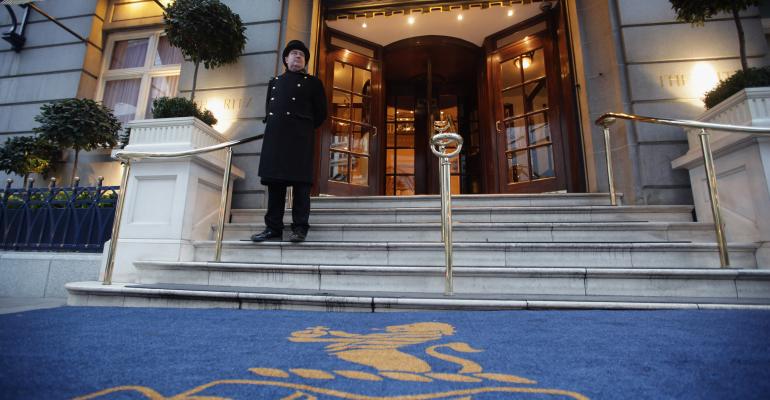As investigators work to piece together why Stephen Paddock sprayed bullets from the 32nd floor of the Mandalay Bay hotel in Las Vegas, some security experts are skeptical the mass shooting will bring significant changes to the security programs of hotels or other commercial structures.
Paddock, a casino regular, opened fire into a crowd at an outdoor concert across the street from the hotel on October 1st, killing 58 people and wounding hundreds more. Paddock, who killed himself as police were closing in on him, had an arsenal of more than 20 guns and hundreds of rounds of ammunition in his suite. Police said that over time Paddock carried in at least 10 suitcases, and they discovered three video cameras, two in the hallway and one over the door’s peephole, reports The New York Times.
“This is going to change everybody’s thinking,” says Daniel Aloe, president of Pittsburgh-based Capital Asset Protection Inc, a security solutions provider.
At least one major resort—the Wynn Las Vegas—increased its security in the aftermath of the shooting. On Monday afternoon, a 10-minute wait formed at the Wynn’s entrance as guards used metal-detector wands to scan visitors and check their bags, according to Bloomberg.
However, some security experts acknowledged that the hospitality industry—or commercial properties in general—is unlikely to make permanent security changes.
While some adjustments—like the scanning—may crop up at some hotels in the near future, Sean Ahrens, a security consultant and market group leader with Affiliated Engineers Inc, a multi-discipline technical consulting firm, says he does not expect changes like this to last. Most hotels are not able to facilitate scanning of its guests continually—for example, many do not have the architecture to support long queues of waiting customers, Ahrens says. Security checks also tend to cause discomfort, he adds. “Eventually, it will have to fall off because basically it will be trumped by convenience,” says Ahrens, who is like most of the sources in this article is a member of security organization ASIS International, and it Commercial Real Estate Council.
The Wynn’s screening of guests will likely be the exception in the industry, says Manny Gomez, president of New York-based MG Security Services LLC. “I think that most other hotels either don’t want to risk losing guests because of higher scrutiny or they just don’t have the budget for it,” he says.
In addition, gun shows are regularly held at convention centers and in hotels, Gomez says. While such events have heightened security, attendees still go to the venues and stay in hotels with firearms, he adds. Aloe, whose firm has provided security for such shows at convention centers in Pennsylvania, says they are highly regulated, and weapons are rendered ineffective before entering a venue. He adds that some shows travel, so often attendees may not need to stay in a hotel.
Many apartment and condominium buildings also often seek comfort first for residents, Aloe says. At many gated communities, for example, security staff may ask to check for identification, or simply for a visitor to state whom they are visiting, he adds. Most security guards are unarmed.
Usually, there is a knee-jerk reaction after a major mass-casualty incident to change security protocols, but changing security programs is a long process, says Jeff Zisner, CEO of Culver City, Calif.-based AEGIS Security & Investigations. Whether individual operators want to invest funds to beef up their existing security measures in light of events that they feel might never happen is a business and public relations decision, he adds. “I can’t force them to use metal detectors,” he says.
After the Sept. 11, 2001 terrorist attacks, commercial buildings—like airports—changed their security measures, says Carlos Villarreal, senior vice president of commercial real estate operations at Secur America LLC’s Chicago branch. Buildings started restricting access and requiring identification cards, which led to a shift for American workers, he notes.
It could be possible that the shooting—a single event—will also change how hotels handle baggage check-ins, Villarreal says, adding that a bellman at a hotel’s entrance could collect bags to be inspected.
Zisner also says it could be possible that hotels mandate that bellhops collect incoming guests’ bags, which wukk then taken to a back office to be screened, like at an airport, before returning the bags to a guest’s room. “That would perhaps cause minimal delay for the guest and be a value-added service to the guest that’s minimally invasive,” he says. Still, operators would likely incur big costs to acquire scanners and hire more bellhops, he notes.
However, Villarreal, who specializes in the security of high-rise office buildings, says that he does not expect many changes to most office buildings as a result of this incident. These buildings already have physical barriers, like turnstiles, to control access. Anyone who wants to bring in a large amount of material often would have to do so through the building’s loading dock, like scheduled shipments, he says. Someone entering a building’s front doors with a large amount of material likely would strike security staff as suspicious, as office workers do not normally have more than a briefcase or a backpack, he adds.
Gomez also predicts that many office building landlords might be reluctant to install metal detectors or check for firearms, as they might be afraid of losing tenants.
The shooting, however, does open another area for security experts to scrutinize—holding outdoor events near tall structures—as no one anticipated an active shooter from the 32nd floor of a hotel, Gomez says. Security experts and law enforcement may now start to look at holding such events either indoors or adding roofs to outdoor venues, he notes. “This was totally off the playbook,” Gomez says.
A key piece to the security of these properties is continuing to increase workers’ and the public’s awareness of suspicious behavior, and to report anything odd, the experts say.
“We’ve got to get back to listening to our gut feeling,” Ahrens says.

